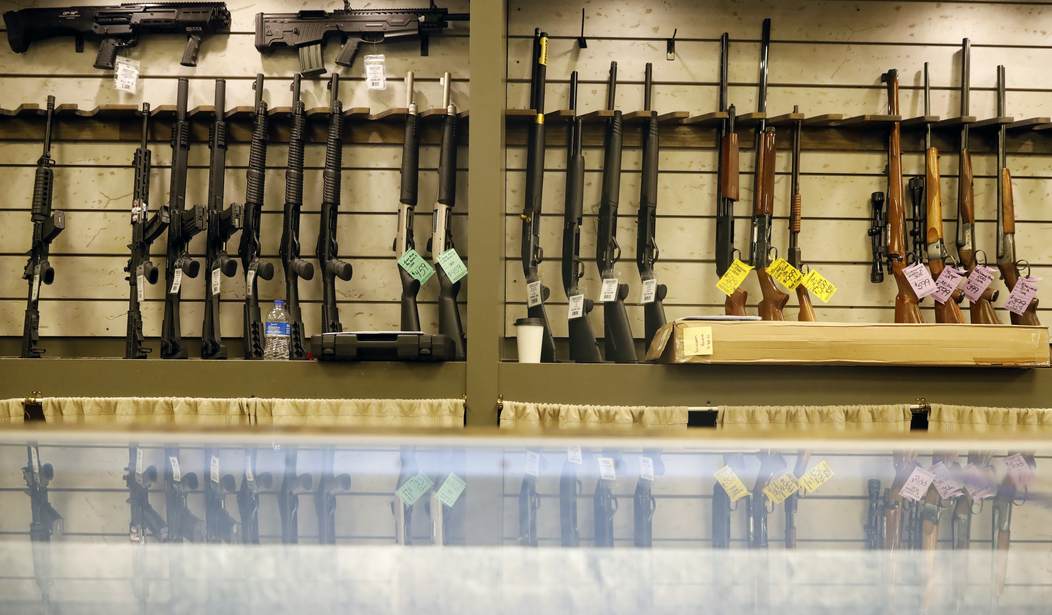President Biden keeps telling Americans that gunmakers are “exempt from being sued. … This is the only outfit that is exempt from being sued.” Apparently, someone forgot to tell the Mexican government about that.
Last week, the Mexican government sued several U.S.- gun makers, seeking $10 billion in damages. They claim that the companies are “conscious of the fact that their products are trafficked and used in illicit activities against the civilian population and authorities of Mexico.” Among those facing the lawsuit are well-known names: Smith & Wesson Brands, Barrett Firearms Manufacturing, Beretta USA, Glock, and Colt. The case was filed by the Brady Campaign, a U.S. based gun control organization.
The lawsuit by Mexico is just the latest in a long string of such suits. Remington was forced into bankruptcy last year because of a lawsuit claiming that company marketing inspired Adam Lanza to commit the massacre. In July, a California judge allowed a lawsuit against Smith & Wesson to go forward because the company had marketed the gun used in a shooting through “video game-like commercials.” On Thursday, Biden met with state Democrat Attorneys General to discuss additional ways to bring lawsuits against gun makers.
Despite Biden’s claims to the contrary, gun makers have never been exempted from lawsuits. If gun makers make defective guns, you can sue them. Likewise, if they break the law (e.g., sell a firearm without a background check), you can sue them.
But these new lawsuits are trying to create a new form of liability. They want gun manufacturers to be held civilly liable for misuse of guns they sell. That would lead to lawsuits against manufacturers and sellers whenever a crime, accident, or suicide occurs with a gun. The result would be to put gunmakers out of business.
Recommended
Imagine what would happen if the car industry faced similar rules. The National Safety Council estimates that 39,404 Americans died and 4.5 million were injured from car accidents in 2018. Many criminals also use cars to commit crimes.
Mexico does have a serious crime problem. Its murder rate was six times the U.S. rate in 2019, but that doesn’t make the lawsuit any less frivolous. Mexican officials blame America for its relatively strong gun rights, but the problem stems from Mexico’s lucrative illegal drug trade. If cartels didn't get their guns from the U.S., they would just get them from somewhere else. After all, cartels will never just give up arms and let their rivals take control.
The fully automatic guns that are often used to commit murders in Mexico are strictly limited on U.S. soil. And grenades simply can’t be bought in America, but the Mexican government seized more than 13,000 grenades between 2005 and 2014.
So where do Mexican criminals get their guns? “Most cartels buy in bulk, and the weapons are coming from places like Nicaragua and other South American countries. Also Asia and some from the Middle East,” a Tijuana-based police authority who requested anonymity recently told Fox News.
“These kinds of guns—the auto versions of these guns—they are not coming from El Paso,” Ed Head, a firearms instructor in Arizona who spent 24 years as a U.S. Border Patrol agent, told Fox News. “They are coming from other sources. They are brought in from Guatemala. They are brought in from places like China. They are being diverted from the military. But you don’t get these guns from the U.S.”
And if Mexico wanted to do more to restrict the flow of American guns, they could have. A 2016 U.S. Government Accountability Office report complained of limited collaboration from Mexican authorities on tracing guns.
According to data from the Bureau of Alcohol, Tobacco, Firearms and Explosives, 70% of all criminally owned guns in Mexico come from the U.S. But these figures are based only on the limited number of guns that Mexican authorities have submitted to the ATF for checking. That’s a small subset of all of the guns that the Mexican government has seized.
From 2007 to 2008, Mexico submitted 11,000 guns to the ATF but seized 29,000 guns. 6,000 were successfully traced and 90% of those traceable weapons came from the U.S. Therefore, only about 5,400 out of 29,000 firearms collected in Mexico were actually traced back to America. The guns that have been traced back to the U.S. were sold at retail 14 years earlier and following an FBI background check.
If anything is to blame for Mexico’s violent crime problem, it is the country's strict gun control laws. Out of an adult population of 98 million, only a few thousand people are legally licensed to own guns.
Each applicant has to pay a $2,124 licensing fee — a massive sum for most Mexicans. Then, getting permission to purchase a gun is a separate hurdle that requires passing background checks which take six months to complete.
For decades, Mexico has had only one gun store in the entire country — a military-run establishment in Mexico City. The store’s prices are very expensive, and the most powerful rifle that you can buy there is a mere .22 caliber. And there’s no “gun-show loophole” in Mexico — any person-to-person firearm transfers are illegal without an “extraordinary” permit that never seems to be issued. A person may only sell a gun to the government, and then the government has to decide to sell it to someone else.
It wasn’t always this way. Mexicans had a right to own guns until 1971, when the constitution was amended to give the federal government total control over firearm access. The following year, the government passed strict gun-control measures. And since then, Mexico’s murder rate has approximately doubled.
Strict gun-control laws and high homicide rates often go together. It’s a pattern that also holds true in Brazil and Russia. And if you look across all countries — or limit oneself just to developed countries — the ones with the highest gun-ownership rates tend to have the lowest murder rates from mass shootings.
Every place in the world that has banned either all guns or all handguns has seen murder/homicide rates go up. There’s no data to suggest that private legal gun ownership is driving up crime anywhere in the world.
But lawsuits such as the Mexican government’s will drive up the price of guns. They will create massive legal bills for gun makers, but the public won’t be any better off for it. Law-abiding citizens of modest means will find themselves defenseless.
Lott is the president of the Crime Prevention Research Center and most recently the author of “Gun Control Myths.” Up until January, he worked in the U.S. Department of Justice as senior adviser for research and statistics.

























Join the conversation as a VIP Member